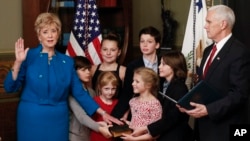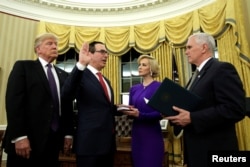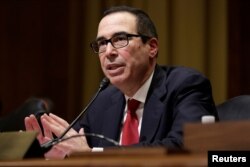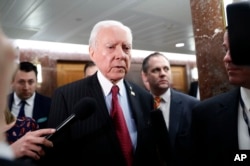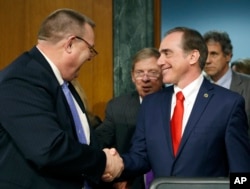The U.S. Senate voted Tuesday to confirm former wrestling executive Linda McMahon to lead the Small Business Administration (SBA) as part of President Donald Trump's Cabinet.
The vote, 81-19, was a rare show of bipartisanship in Trump's politically fraught effort to get his Cabinet nominees approved.
McMahon sailed through the committee level of the confirmation process, advancing to the full Senate on an 18-1 vote. She and her husband, Vince McMahon, founded and built the popular World Wrestling Entertainment company and were major Trump campaign donors.
The SBA's mission is to support entrepreneurs and small businesses, of which there are about 28 million in the U.S.
WATCH: McMahon sworn in as head of Small Business Administration
"Small businesses help drive America's economy," Senate Majority Leader Mitch McConnell said after she was confirmed. He said he was confident McMahon "will prioritize growing jobs over growing government bureaucracy."
On Monday, the Senate confirmed Steve Mnuchin, 53, as Trump's pick for Treasury secretary. Mnuchin, a former Wall Street executive, received a party-line vote of 53-47, with Republicans lining up in support and Democrats vociferously opposed.
“Under any objective standard, Mr. Mnuchin has ample experience, credentials and qualifications for this important position,” said Republican Orrin Hatch of Utah, chairman of the Senate Finance Committee.
Shortly after his Senate confirmation, Mnuchin was sworn in at the White House by Vice President Mike Pence. Also in attendance was Trump, who praised him saying "our nation's financial system is truly in great hands."
After rising to become a partner at Wall Street giant Goldman Sachs, Mnuchin led a group of investors that bought out a failing California bank at the height of the 2008-2009 financial crisis. Under his leadership, the bank foreclosed on thousands of distressed properties, a fact that Democrats repeatedly brought up at Mnuchin’s confirmation hearing and in spirited floor debate ahead of the vote.
“I simply cannot forgive somebody who took a look at that banking crisis, who took a look at the pain Wall Street had sent in a wave across all of America, and thought, ‘Aha! Here’s a great new way to make money foreclosing on people,’” said Democratic Senator Sheldon Whitehouse of Rhode Island. “Sorry, I can’t vote for somebody like that.”
At his confirmation hearing, Mnuchin stressed that the bank he led, OneWest, made risky real estate loans before his investor group took over the institution.
He also said OneWest did allow some homeowners to modify their loans and avoid foreclosure, and that, while mistakes were made in the processing of some foreclosures, the bank did follow established guidelines for seizing delinquent properties.
Democrats were not satisfied. They accused the nominee of lying when he asserted that OneWest did not use an automated foreclosure procedure in which paperwork was “robo-signed.”
“They foreclosed on families quickly without anyone reading the documents,” said Democrat Debbie Stabenow of Michigan. “They had the machine signing, signing, signing.”
“I think people should quit using false arguments against this man,” Hatch retorted. “My colleagues [Democrats] have tried to smear Mr. Mnuchin. In essence, they’ve tried to relitigate the foreclosure crisis with Mr. Mnuchin’s company confusingly placed in the crosshairs.”
Hatch noted that Mnuchin is hardly the first bank executive or Wall Street titan to serve as Treasury secretary. The Utah Republican noted that former President Barack Obama’s Treasury secretary, Jack Lew, also was a banking executive and investor.
“I found it particularly interesting to see my friends raise concerns about matters that did not bother them in the least when it came to vote for Democrat(ic) nominees for Treasury secretary,” Hatch said. “Many issues that seemed to be of little or no concern to my colleagues, my friends on the other side, during the confirmation process for [former] Secretary Jack Lew have been considered disqualifying for Mr. Mnuchin.”
Mnuchin is a believer in so-called "supply-side" economics – that tax cuts generate additional economic activity, thereby boosting prosperity as well as tax revenues to the government. His philosophy matches that of congressional Republicans eager to cut taxes, but invites scorn from Democrats.
“The main part of what he is advocating is tax cuts for the wealthy,” said Democratic Senator Ben Cardin of Maryland. “Here’s the problem: How do we pay for this? How do we offset the cost of these tax cuts, because I don’t think any of us want to add to the deficit.”
“I know many working people voted for President Trump in hopes that he would change the power structure in Washington as he promised so many times,” said Minority Leader Chuck Schumer, a New York Democrat. “His Cabinet was the first way to see if he really meant it. It turns out, President Trump was using populist rhetoric to cover up a hard right agenda, which will be carried out by this bevy of billionaires and bankers and hard right ideologues.”
Mnuchin is the latest Trump Cabinet pick to receive full-throated, lockstep opposition from Democrats, a pattern Republicans see as pointless and counter-productive.
“My colleagues are, of course, free to do whatever they think will help them hobble the new administration and score points with their political base,” Hatch said. “However, they should know that these tactics do absolutely nothing to help American families seeking greater opportunities and economic growth.”
One departure from that partisan pattern was Monday's unanimous confirmation of physician David Shulkin to lead the Department of Veterans Affairs, the government's second-largest agency.
Shulkin had been the department's top health official since 2015, and is the only Trump Cabinet official who served during the previous administration of former President Barack Obama.
